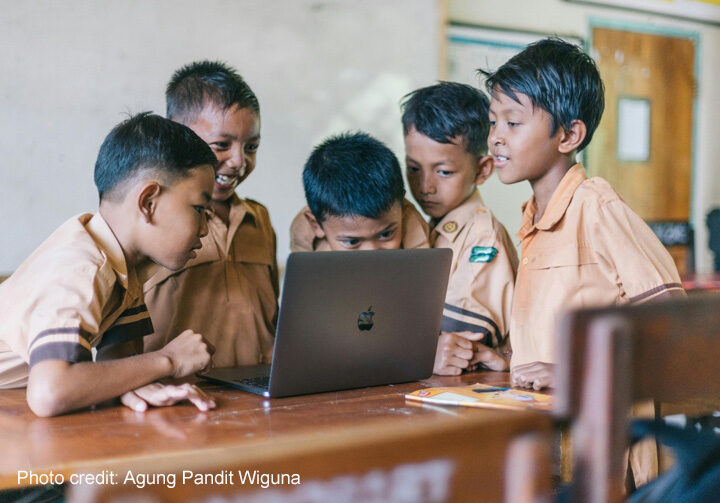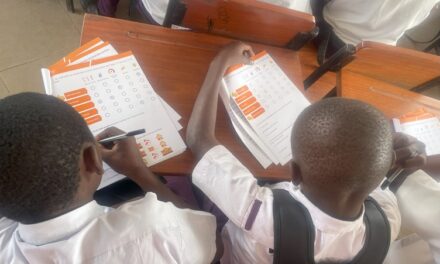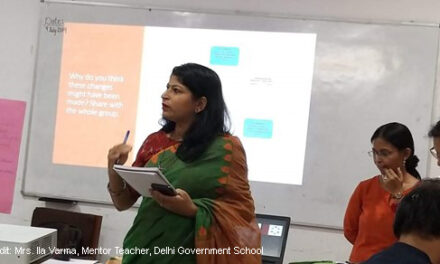This blog was written by Dina Fajardo Tovar, Dexterity Club. For the 2025 UKFIET conference, a record 37 individuals from 15 countries, including Dina, were provided with bursaries to assist them to participate and present at the conference. The researchers were asked to write a short piece about their research or experience of attending the conference.
The education and international development sector has found in technology and AI an excellent way to scale impact. Digital technology and AI have been used as powerful tools to reach more communities, children, teachers and families, especially in areas where access to quality education remains limited.
At the UKFIET Conference 2025, we saw many inspiring projects making this promise tangible. Some showcased the use of digital games that help children practice and develop their numeracy and literacy skills in playful and engaging ways. Others presented online platforms that allow teachers to train at their own pace, in their own time, and with fewer resources, offering flexible and scalable professional development opportunities. We also learned about digital tools designed to support the monitoring and evaluation of knowledge and skills, helping educators and organisations better understand learning progress and impact. At the policy level, ministries are working to expand internet access and provide devices to children, often framed as preparing them “for the future” or “for the future of work.”
All these initiatives hold enormous potential. Yet, because we are talking about education, and therefore about children, families, and schools, we must pause and ask:
- What are the implications of expanding digital access?
- What are the potential risks?
- How do we ensure technology is not only available but also used to truly benefit learners?
Recent global research reminds us that while digital technology and AI can widen access to learning opportunities, they can also amplify existing inequalities and introduce new vulnerabilities. Alongside benefits, studies have documented increased exposure to biased information, inappropriate or harmful content and online risks such as cyberbullying, digital addiction and negative effects on children’s wellbeing associated with overuse. For instance, evidence from the “One Laptop per child” programme in Peru illustrates this complexity. Providing laptops and internet access did increase children’s exposure to technology and improved their digital skills. However, it did not translate into better academic achievements, partly because many children used computers for entertainment rather than learning. Similarly, a report from Argentina showed that while children are learning and connecting through digital technologies, they are also facing significant risks. One in three reported meeting in person someone they first met online, two in three searched for quick ways to make money, one in two were exposed to online hate, violence, discrimination or drug use, and one in four came across suicide-related content.
These findings highlight that access alone is not enough. As we expand connectivity and integrate digital technology and AI into education systems, we must also strengthen the values, skills and critical understandings that help learners, teachers and families to use technology responsibly and ethically, enhancing wellbeing and community life, while reducing risks. This means that everywhere digital access is being introduced, there must be intentional digital citizenship education which focuses on teaching and learning how to navigate technology responsibly, ethically and meaningfully.
Values at the heart of digital citizenship
This is where our project comes in. At the UKFIET conference, we presented Power Up: Values at the Heart of Digital Citizenship, a project that explores the fundamental values and competencies that may enable us to make informed choices when engaging with digital technologies.
We co-developed a framework with four key areas that serves as a lens for thinking about how to engage with digital technologies purposefully, meaningfully and positively:
- Key Area 1 explores how we can critically engage with information and content in digital spaces, nurturing discernment and curiosity.
- Key Area 2 examines how we can balance wellbeing, digital use, responsible and purposeful engagement with technology.
- Key Area 3 presents how we can build meaningful connections online, communicate with care and foster inclusive communities.
- Key Area 4 focuses on our digital footprint and presence, encouraging learners to reflect on this and how it contributes to the collective digital world.
In addition, we have created lesson plans, thinking cards and resources that schools and families can use to spark conversations, develop new practices and integrate these competencies into everyday life. The programme emphasises the importance of dialogue to explore the foundations of digital technology and how certain values and skills can help them children challenges and build a more positive digital life that benefits themselves and their communities. Our hope is that Power Up can serve as a practical tool to complement the expanding digital access efforts that ministries, NGOs, and schools are driving worldwide.
Looking ahead
At the UKFIET conference, one of the key takeaways was the importance of leveraging technology and innovation to advance our shared goal of ensuring quality education for all. Technology can help us move faster and further, but if our goal is to use it for education and development, we must also be intentional about what kind of digital citizens we are nurturing.
Through Power Up, we aim to complement these global efforts by fostering the values, skills and understandings that enable people to use technology wisely and purposefully. We want to continue building partnerships and creating opportunities for educators, families and young people to engage with digital citizenship in ways that are grounded in values, responsive to context and oriented toward collective wellbeing. We invite others who share this vision to connect with us and join the conversation on how to make digital citizenship a central part of inclusive and meaningful education for all.




